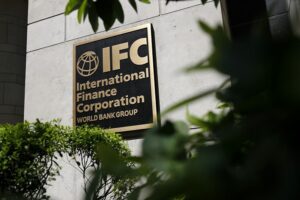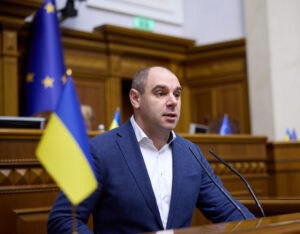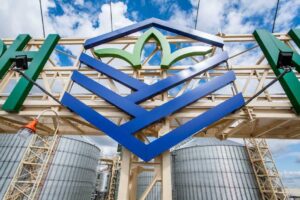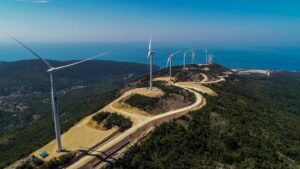
On December 11–12, Bucharest will host the forum “Rebuilding Ukraine: Security, Opportunities, Investments,” organized by the Center for New Strategies under the patronage of the Romanian Ministry of Foreign Affairs and the Ukrainian Ministry of Foreign Affairs. This event, which is being held for the second time, brings together officials, representatives of international organizations, the private sector, international financial institutions, and experts from various fields, such as defense, finance and banking, energy, infrastructure, digitalization, cybersecurity, and agriculture. The conference will be attended by numerous representatives of Ukrainian regional authorities who are directly involved in the planning and implementation of recovery projects.
Participants will gain a deeper understanding of Romania’s role in the recovery process in Ukraine, especially in the southern regions of the country located near Romania, as well as in issues related to connectivity, energy, and cross-border cooperation projects that have a positive economic impact on communities in both Romania and Ukraine. Over the course of two days, the event will feature more than 30 panel discussions and parallel sessions with guests from Europe, North America, and Asia. The discussions will address key elements of Ukraine’s reconstruction: security and defense, infrastructure, communications, financing and investment, green transition, energy security, digitalization, human capital, agriculture, and cross-border cooperation.
The panel discussions will address important topics such as:
● Regional security architecture and possible diplomatic developments;
● Lessons learned from the war in Ukraine and how they can be applied by Ukraine’s allies;
● Cooperation for the development of projects in the defense industry;
● Connectivity projects between Romania, Ukraine, and the Republic of Moldova;
● Financial instruments, guarantees, investments, and the role of the private sector;
● The strategic role of the Danube in Ukraine’s reconstruction;
● Black Sea ports;
● Energy sustainability, rare minerals, and the future of the green transition;
● Cloud infrastructure, advanced digitalization, and cybersecurity;
● Reintegration of displaced persons, veterans, and community recovery;
● Ukraine’s integration into the EU and necessary reforms;
● The role of local communities and minorities in cross-border cooperation.
The conference provides a unique platform for establishing links between decision-makers and the business community, financial institutions, local authorities, and experts from various fields, facilitating the creation of concrete partnerships and sustainable solutions for Ukraine’s recovery. Simultaneous interpretation in Romanian, Ukrainian, and English will be provided during the conference, as well as online streaming.
Media partner of the forum: Interfax-Ukraine news agency
Event website: https://reconstruct-ukraine.ro/

Shares of biopharmaceutical company Enlivex Therapeutics, whose securities are traded on the Nasdaq exchange, rose after the announcement of its intention to raise $212 million to create a “digital treasury” based on the RAIN token, against which the value of the token itself increased by 115% over the past day.
Enlivex plans to conduct a private placement (PIPE), in which it will issue 212 million new shares at a price of $1 per share, which is 11.5% higher than last Friday’s closing price. The company intends to use all the funds raised to purchase RAIN tokens, while Enlivex will retain its core business profile in biopharmaceuticals.
The market reacted positively to the announcement: at the end of trading on Monday, Enlivex’s share price rose by about 13%, while the RAIN token rose by 115% over the past 24 hours, the publication notes.
RAIN is the native token of the decentralized prediction market on the Arbitrum blockchain, where users can bet on the outcome of real-world events — from elections to show business events — without intermediaries, using smart contracts for settlements and transparency.
Enlivex also announced that after the deal is completed, former Italian Prime Minister Matteo Renzi will join the company’s board of directors, which management expects will strengthen the issuer’s international position and increase investor confidence.
Enlivex’s interest in prediction markets coincides with the rapid growth of this segment after the 2024 elections: the Polymarket platform has attracted about $2 billion in investments from ICE, the parent company of the New York Stock Exchange, and Kalshi has attracted about $1 billion from Sequoia Capital and other investors, No Worries emphasizes, citing a statement by Enlivex CEO Chai Novik that institutional interest in leading prediction market players indicates the maturity of the industry and its potential.

The International Finance Corporation (IFC), part of the World Bank Group, will contribute $25 million to the Rebuild Ukraine Fund LP (REBUF) private equity fund, which was launched a year ago by leading Ukrainian investment group Dragon Capital.
According to the IFC website, its board of directors approved the project at a meeting on November 3.
The corporation specified that REBUF is focused on small and medium-sized enterprises, has a target size of $250 million, and is a universal fund that focuses on consumer goods and services, healthcare, pharmaceuticals, financial services, agriculture-related sectors, construction materials, retail, and technology.
“The fund aims to acquire controlling stakes through buyout or growth capital strategies in mature companies,” the IFC added.
According to the materials, the investment will be backed by a first-loss guarantee of 50% of its amount, supported by France and other guarantors.
As the corporation noted, its contribution as an anchor investor will be crucial in supporting the fund in achieving its first closing in a challenging fundraising environment. The IFC recalled that since Russia’s full-scale invasion of Ukraine, only one private equity fund has been launched, and its successful closing required significant support from development finance institutions (DFIs), including the anchor role of the IFC (the $350 million Horizon Capital Growth Fund IV – IF-U). REBUF is expected to require similar support and will be financed primarily by DFIs, according to published materials.
Andriy Nosok, managing director and head of direct investments at Dragon Capital, announced at the Ukraine Recovery Conference in Rome in July that the company would invest $20 million of its own funds in REBUF. In addition, the European Bank for Reconstruction and Development approved a decision to contribute $25 million to the fund in early July. According to Nosok, the first closing of the fund was planned for September this year.
He recalled that Dragon Capital has been investing in private equity in Ukraine for 25 years, including managing direct investment funds since 2010. REBUF is the third such fund, which follows the same strategy as the previous ones. According to the REBUF presentation, the size of investments in companies is $7-30 million.
Dragon Capital is one of the largest investment groups in Ukraine in the field of investment and financial services, providing a full range of investment banking and brokerage services, direct investments, and asset management for institutional, corporate, and private clients. The company was founded in 2000 in Kyiv. According to founder and CEO Tomas Fiala, the group’s investment portfolio currently includes nearly 50 different companies or real estate projects. Between 2015 and 2021, the company invested approximately $700 million in Ukraine, excluding reinvestments, and plans to invest $100 million in 2025.
As reported, the EBRD and IFC also plan to contribute EUR60 million and EUR40 million, respectively, to the capital of the new Amber Dragon Ukraine Infrastructure Fund I with a declared target size of EUR350 million. The EBRD Board of Directors will consider this project on December 3. The European Investment Bank (EIB) already approved a contribution of EUR40 million to this fund at the end of September.

171 enterprises and communities from 14 regions of Ukraine have used the simplified procedure for changing the designated use of agricultural land to industrial and energy land for the construction of new enterprises and power plants. This was announced at the Kyiv International Economic Forum by Dmytro Kysylevskyi, Deputy Head of the Verkhovna Rada Committee on Economic Development. He is the author of the law that reduced the duration of changing the designated land use from 1–3 years to 1.5 months.
Decisions to change the designated purpose of land under the simplified procedure have been adopted for the construction of production and warehouse facilities (75 plots), production of energy from renewable sources (42 plots), industrial production and industrial parks (26 plots), and other facilities (28 plots). The highest number of positive decisions was adopted in Kyiv, Zakarpattia, Rivne, Zhytomyr and Kirovohrad regions. No positive decision has yet been adopted in Sumy, Donetsk, Zaporizhzhia, Ivano-Frankivsk, Luhansk, Odesa, Kharkiv, Kherson, Khmelnytskyi, and Cherkasy regions.
In total, under the simplified procedure, the designated use of land has been changed from agricultural to industrial and energy use for plots with a combined area of 1,050 hectares. Of these:
434 ha – production of energy from renewable sources
385 ha – production and warehouse facilities
121 ha – industrial production and industrial parks
110 ha – other.
“Land purchase and the subsequent change of its designated use for a long time was one of the most time-consuming and corruption-prone stages of making investments in industry and energy. On average, this simple procedure in essence used to take 2–3 years of bureaucracy, corruption, and humiliation of entrepreneurs. Now the situation has changed. The simplified procedure takes 1.5–2 months, and it allows saving time and money when launching new production. But most importantly, investors who dare to build industrial or energy facilities during the war feel a better attitude from the state,” noted Dmytro Kysylevskyi.
The simplified procedure for changing the designated use of land plots applies to agricultural land outside populated areas, where no urban planning documentation has been developed, for the placement of facilities in industry and energy defined by law:
Industrial buildings and warehouses
Pipelines, utilities, and power transmission lines (excluding main oil pipelines and main gas pipelines)
Complex industrial structures (excluding enterprises and facilities for the enrichment and processing of nuclear materials; facilities and furnaces for waste incineration; nuclear power plants)
Buildings for agricultural purposes, forestry, and fisheries.

One of Ukraine’s largest grain market operators, Nibulon LLC, recouped approximately $1 million in investments in a digital twin of elevators developed on the basis of the IT-Enterprise ERP system in less than a year by reducing the number of employees and grain losses.
“In conditions of staff shortages, the system allows us to reduce our dependence on manual labor… Previously, 80-100 people worked at one elevator, today there are about 20-30,” according to a joint press release issued by the companies on Monday.
It is noted that the implementation of the new system from IT-Enterprise has improved accounting accuracy and reduced grain losses by 1%.
“We have improved quantitative and qualitative accounting and automated every step of the process: the movement of grain from the moment it arrives at the elevator to shipment to the end consumer, including control of grain quality indicators and resources spent on its processing,” the release quotes Nibulon IT Director Mykola Ryasko as saying.
In addition, it was possible to ensure transparent access to grain quality parameters determined as a result of laboratory tests. In particular, the data is now available in a mobile application along with other operational information.
The agricultural holding specified that it integrated the digital twin of 23 elevators in 2024. “A digital twin is a digital copy of production that is updated in real time based on data from sensors and other sources. This allows you to effectively simulate elevator operating modes and manage all processes from anywhere in the world,” commented Oleg Shcherbatenko, CEO and founder of IT-Enterprise, on the project.
As previously reported by Andriy Vadatursky, owner and CEO of Nibulon, in 2024 the company invested $2 million in the digitization of production processes, which was directed towards the creation of a digital copy of the elevator and a mobile application. According to him, the software has been installed on all of the grain trader’s elevators and connected to a common network.
Before the war, Nibulon cultivated 82,000 hectares of land in 12 regions of Ukraine and exported agricultural products to more than 70 countries around the world. In 2021, the grain trader exported a record 5.64 million tons of agricultural products. After the war began, the company was forced to move its central office from Mykolaiv to Kyiv.
This year, Nibulon plans to increase grain exports to 4 million tons from 2.5 million tons last year, while its land bank has shrunk to 1,000 hectares and its workforce has fallen from 6,000 to less than 2,000.

According to Serbian Economist, Alcazar Energy, an international company operating in Serbia, among other countries, intends to increase its investment in Montenegro from the previously planned $200 million to $500 million, co-founder and managing partner Daniel Calderon said in an interview with the media.
According to Calderon, the company will begin construction of the 118.8 MW Bijela wind farm in the first quarter of 2026. The investment in the project will amount to about $200 million.
“We are preparing the site and purchasing equipment — this is a large and strategically important project. But this is only the first part of our investments in Montenegro,” Calderon said.
He added that over the next five years, the company’s investments could grow to half a billion dollars, and the total investment in the development of renewable energy sources in Montenegro could reach $4-5 billion by 2040.
“We expect that about 10% of these investments will go to Alcazar Energy projects, and these will be the first steps in a major energy transformation of the region,” Calderon said.
According to him, the company is considering the possibility of implementing several additional projects in Montenegro, but the details are not yet disclosed.
At the EU-Montenegro conference, 14 joint projects with European companies were presented, half of which are related to investments in wind farms, solar parks, and energy storage systems.
Alcazar Energy is an international company specializing in the development, construction, and management of renewable energy facilities.
Founded in 2014, it is headquartered in Dubai (UAE). The company is active in the MENAT region (Middle East, North Africa, Turkey) and the Balkans.
Its key projects include wind farms and solar power plants in Serbia, Jordan, Egypt, and Turkey. Alcazar recently began construction of the largest wind farm in the Western Balkans in North Macedonia.
Source: https://t.me/relocationrs/1587